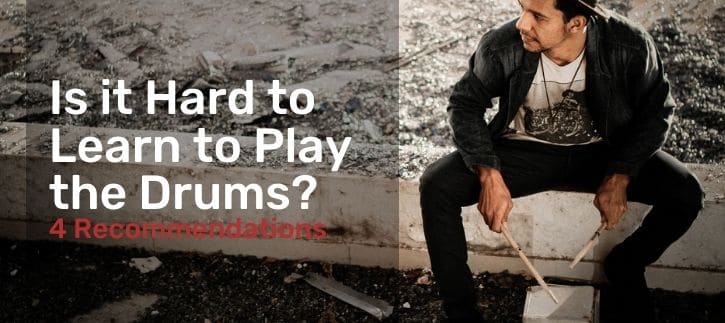So you want to learn to play the drums? Luckily, many people have gone before you on your journey. So, we’ve compiled the 4 fastest ways to learn. So, whether it’s you or your kid who wants to learn how to play the drums. It doesn’t require any natural born ability to play that kid’s electronic drum. Instead, follow our four steps below.
Having said that, you have to set yourself up for success in the right way to be effective in learning drums. There are several things that you can do to speed up your learning process. They include:
Learning with a Teacher
We know that learning from an expert helps speed up all sorts of endeavors, especially creative ones. Whether you’re writing a book, a song, or learning how to play instruments — Having a teacher who has an experience of several years to train you is priceless. A good teacher will:
- Help you establish good technique: There are some technical aspects of drumming that you will be better learning with a teacher. Some of these include correct stick technique, snare work and foot positioning.
- Help you learn stylistic corrections: It is possible to play dynamics or emphases that are off without your untrained ear recognizing it. It is even worse that it is possible to play an off rhythm and find it hard to play in time. Teaching yourself might get you stuck with incorrect styling.
- Help you get the best learning materials: You can easily go for the wrong learning materials because of lack of information. Your teacher will recommend to you the best resources such as books and videos. Such materials will help to progress your skill effectively.
- Help you get the best plying equipment: Being a first-timer, you may find it difficult to choose the best drum kit or drumming sticks. An experienced teacher will recommend to you the best equipment to buy. They may also help you search for it in the market.
- Help in tuning the drums: If your drums are well tuned, they will sound better. Moreover, the correct installing of drums makes them last longer. These technical aspects require an expert, and this is where your teacher comes in to help you.
- Will hold you accountable: One key role of a teacher is to ensure you embrace certain drumming disciplines for effective learning. The teacher will hold you accountable in your learning, turning what could have been a pastime into a serious endeavor.
Learn to Play the Drums at a Slow Pace
It is quite enjoyable to make insane rolls and double bass beats. However, getting ahead of yourself will make learning how to drum a difficult task. If you are starting to learn how to drum, here are a few things to keep in mind:
- Master the meter: One of the crucial things in drumming is staying in time. Playing numerous different amazing rolls without being able to stay in time won’t take you far. Most bands, for example, prefer drummers who can stay in time.
- Learn the basics first: You will always hear basic beats, rolls and fills in music in music all the time. It would be best if you started with these things, moving to the complicated off-beats only when you have perfected the basics.
- Keep off the cymbals for now: Cymbals are fun and loud to play. However, the advice is that you steer clear from them until you have mastered several types of beats. Also, keep off the hi-hats for a later time in your training.
- Play your drums soft: Bashing your drums can easily damage your drums. Likewise, it can lead to the breakage of the drumsticks. Always apply only the force you need to produce a certain volume. It will cushion you from extra expenses of replacing broken equipment.
Be sure to invest in the correct equipment (and it doesn’t have to be expensive)
If you want to practice playing electronic drums effectively, you must invest in the right kit.
If you are buying for your child, get the best kid electronic drums. Here are a few things you need to put into consideration:
- The practice pad: A pad is a piece of essential equipment for both a beginner and an experienced drummer. A good pad will help you to practice without making noise. Moreover, it will occupy very limited space in your house.
- Get a starter drum kit: You will require only a four or a five-piece basic drum set for a start.
- Drumsticks: Let your teacher help you to know which drumsticks to buy. You can also have an extra one in case you break one.
- Metronome: You can invest in a metronome, especially if you have a challenge of keeping a steady beat. It will help you to practice your roll at different speeds.
Practice makes perfect
To learn drums effectively, you should be ready to set time apart to practice. Using the above steps will help you speed up the learning process, but you can shortcut it entirely. Instead, you must practice. You can hardly expect to make any progress if you do not practice what the teacher taught you.
In conclusion, if you want to learn to play the drums, the speed with which you learn mainly lies with you. Your commitment to it will largely influence how fast or slow you will learn.
Click here for the best kids’ electronic drums.

